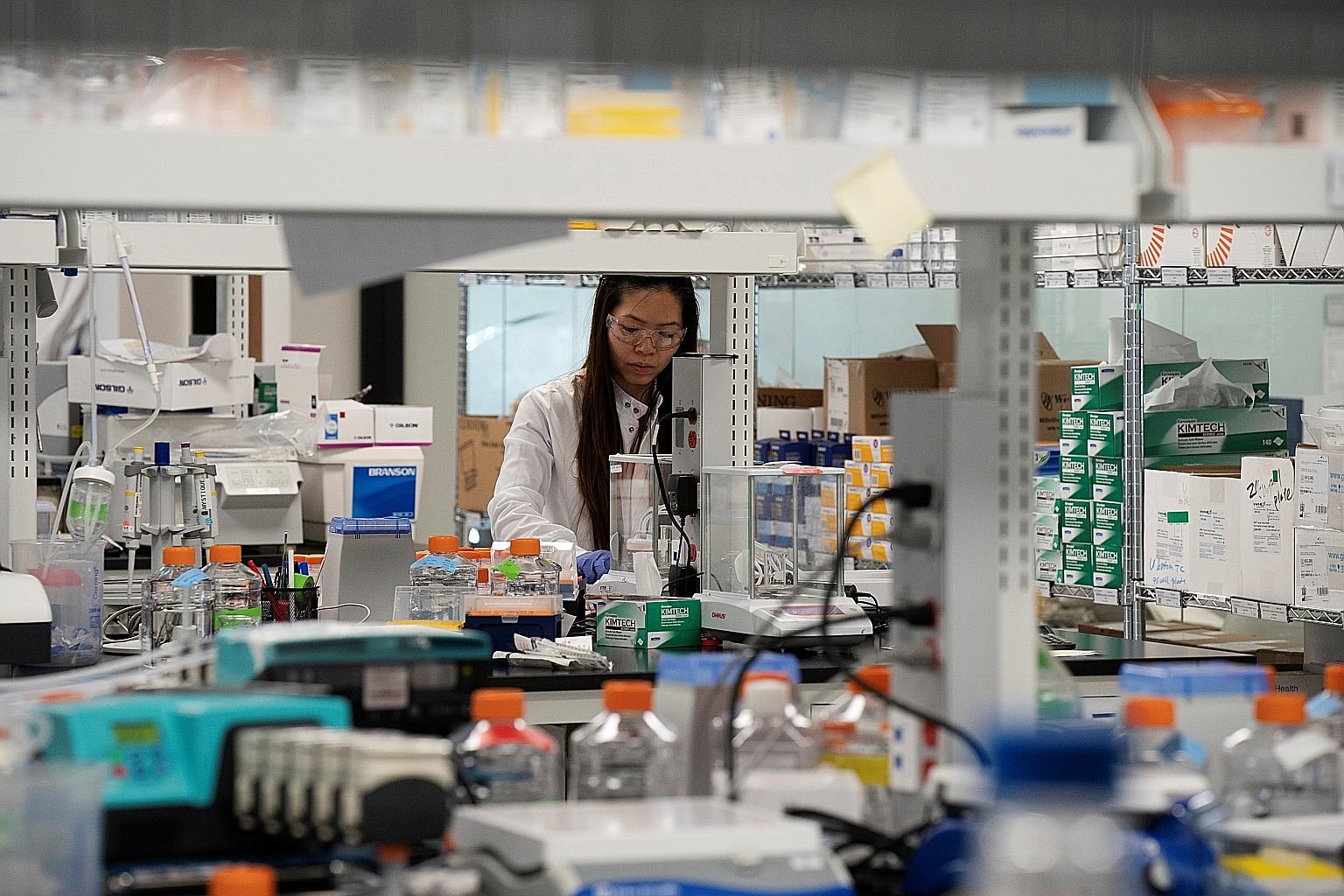COVID-19 SPECIAL
Coronavirus vaccine may be available only next year: Experts
Duke researchers less upbeat than top US expert who forecast year-end vaccine
Sign up now: Get ST's newsletters delivered to your inbox

A research associate from Arcturus Therapeutics working on a coronavirus vaccine in San Diego, California, in March. The team from Duke-NUS Medical School plans to start clinical trials for the mRNA vaccine that it is working on jointly with Arcturus in the next few weeks.
PHOTO: REUTERS
An effective Covid-19 vaccine is likely to be readily available only this time next year at the earliest, several experts have said.
"We may have some good science by the end of the year, and I think we have some leading vaccine candidates," said Duke Human Vaccine Institute chief operating officer Thomas Denny.
But to manufacture and administer the vaccine at scale will require more time, he said during a recent webinar hosted by three Duke researchers.
Dr Anthony Fauci, director of the National Institute of Allergy and Infectious Diseases in the United States, had said that there is a good chance a Covid-19 vaccine would be deployable by the end of this year.
But others are not so hopeful.
"Will you and I get vaccinated this year? No way," said Professor David Ridley, a health economist at Duke University's Fuqua School of Business, who also spoke during the webinar.
"We might have some people vaccinated this year, but the average person won't be vaccinated this year."
Professor Ooi Eng Eong, deputy director of the emerging infectious diseases programme at Duke-NUS Medical School, which has partnered American firm Arcturus Therapeutics to develop a vaccine, concurred.
"We are not going to get rid of the coronavirus in a hurry," he said, adding that it is still unclear how long vaccinations will protect people from the disease.
"If we think about using vaccines in stages, potentially we could get one, possibly at the soonest to me, about this time next year," he added.
"Anything sooner than that is extremely optimistic.
"Others have said we could get it by the end of this year. I am an optimistic person, but I am not that optimistic."
-
About 140 possible vaccines being developed
There are now around 140 potential vaccines being developed worldwide for Covid-19.
As of Wednesday, 16 were being tested in clinical trials on people, according to the World Health Organisation.
American biotechnology firm Moderna and the National Institute of Allergy and Infectious Diseases in the United States, for instance, are developing an experimental vaccine and aim to start phase three trials next month, which will reportedly involve about 30,000 volunteers.
Meanwhile, British pharmaceutical giant AstraZeneca, which is de-veloping a vaccine with the University of Oxford, has agreed to supply the vaccine to Britain and the US. Yesterday, Japanese pharmaceutical company Daiichi Sankyo said it is in talks to secure this vaccine.
In China, clinical trials for a few vaccine candidates are going on, in-cluding the ones that state-owned China National Pharmaceutical Group (Sinopharm) is developing with the Wuhan Institute of Biological Products and the Beijing Institute of Biological Products, respectively.
In Singapore, Duke-NUS Medical School, which has partnered American firm Arcturus Therapeutics to develop a vaccine, aims to start clinical trials in the next few weeks.
Joyce Teo
When it comes to developing a vaccine for a devastating pandemic, time is of the essence.
So, the more vaccine candidates, the higher the chance of finding one that works.
About 140 vaccines are currently being developed worldwide, with 16 of them being tested in clinical trials.
Prof Ooi said his team plans to start clinical trials for the mRNA vaccine that it is working on jointly with Arcturus in the next few weeks.
How quickly the trials can be conducted would also depend on how common the infection is at that time, he said.
Even if vaccine trials proceed smoothly, there remain many hurdles ahead, the experts stressed.
French drugmaker Sanofi, which is developing a vaccine with Britain's GlaxoSmithKline, has said that it expects to have 100 million doses of a vaccine by the end of this year, and an additional one billion doses next year.
Prof Ridley said the pace would be unprecedented and risky, given the odds of success.
"If you think there is a one in eight chance that you are going to get on the market, and you are already spending tens of millions, hundreds of millions of dollars...
"That is the crazy world we live in, and I salute them for it."
It usually takes at least several years to produce a vaccine as the makers would first want to ensure they have a good vaccine before making huge investments to manufacture at scale.
Prof Ridley said: "My guess is there is going to be a little bit of foot-dragging."
Another risk for vaccine developers is the remote chance of the virus disappearing, rendering a Covid-19 vaccine non-essential, said Professor Paul Tambyah of the department of medicine at the National University of Singapore's Yong Loo Lin School of Medicine.
The virus could also poten-tially mutate into a weaker strain, he said.
Once production is under way, there is another major issue, the experts noted - the distribution of the vaccine and who will get it first.
Prof Ridley thinks it makes sense to first vaccinate healthcare and front-line workers, as well as vulnerable people, "everyone from the hospital to the nursing home to the grocery store, and seniors and other people with compromised immune systems".


